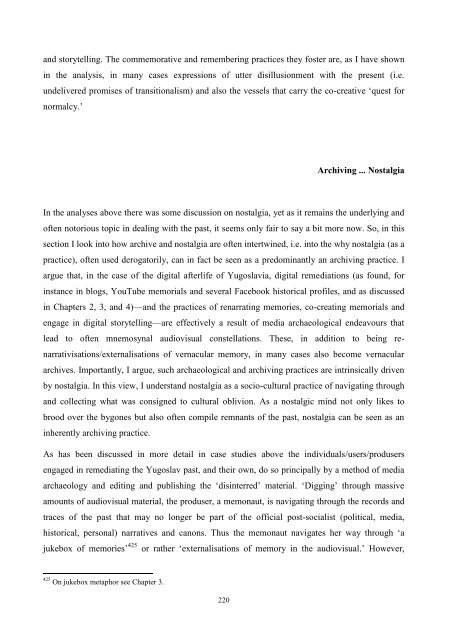UNIVERSITY OF NOVA GORICA GRADUATE SCHOOL ...
UNIVERSITY OF NOVA GORICA GRADUATE SCHOOL ...
UNIVERSITY OF NOVA GORICA GRADUATE SCHOOL ...
You also want an ePaper? Increase the reach of your titles
YUMPU automatically turns print PDFs into web optimized ePapers that Google loves.
and storytelling. The commemorative and remembering practices they foster are, as I have shown<br />
in the analysis, in many cases expressions of utter disillusionment with the present (i.e.<br />
undelivered promises of transitionalism) and also the vessels that carry the co-creative ‗quest for<br />
normalcy.‘<br />
Archiving ... Nostalgia<br />
In the analyses above there was some discussion on nostalgia, yet as it remains the underlying and<br />
often notorious topic in dealing with the past, it seems only fair to say a bit more now. So, in this<br />
section I look into how archive and nostalgia are often intertwined, i.e. into the why nostalgia (as a<br />
practice), often used derogatorily, can in fact be seen as a predominantly an archiving practice. I<br />
argue that, in the case of the digital afterlife of Yugoslavia, digital remediations (as found, for<br />
instance in blogs, YouTube memorials and several Facebook historical profiles, and as discussed<br />
in Chapters 2, 3, and 4)—and the practices of renarrating memories, co-creating memorials and<br />
engage in digital storytelling—are effectively a result of media archaeological endeavours that<br />
lead to often mnemosynal audiovisual constellations. These, in addition to being renarrativisations/externalisations<br />
of vernacular memory, in many cases also become vernacular<br />
archives. Importantly, I argue, such archaeological and archiving practices are intrinsically driven<br />
by nostalgia. In this view, I understand nostalgia as a socio-cultural practice of navigating through<br />
and collecting what was consigned to cultural oblivion. As a nostalgic mind not only likes to<br />
brood over the bygones but also often compile remnants of the past, nostalgia can be seen as an<br />
inherently archiving practice.<br />
As has been discussed in more detail in case studies above the individuals/users/produsers<br />
engaged in remediating the Yugoslav past, and their own, do so principally by a method of media<br />
archaeology and editing and publishing the ‗disinterred‘ material. ‗Digging‘ through massive<br />
amounts of audiovisual material, the produser, a memonaut, is navigating through the records and<br />
traces of the past that may no longer be part of the official post-socialist (political, media,<br />
historical, personal) narratives and canons. Thus the memonaut navigates her way through ‗a<br />
jukebox of memories‘ 425 or rather ‗externalisations of memory in the audiovisual.‘ However,<br />
425 On jukebox metaphor see Chapter 3.<br />
220

















